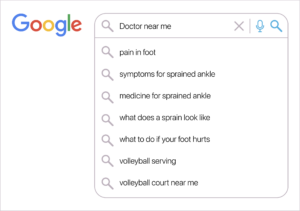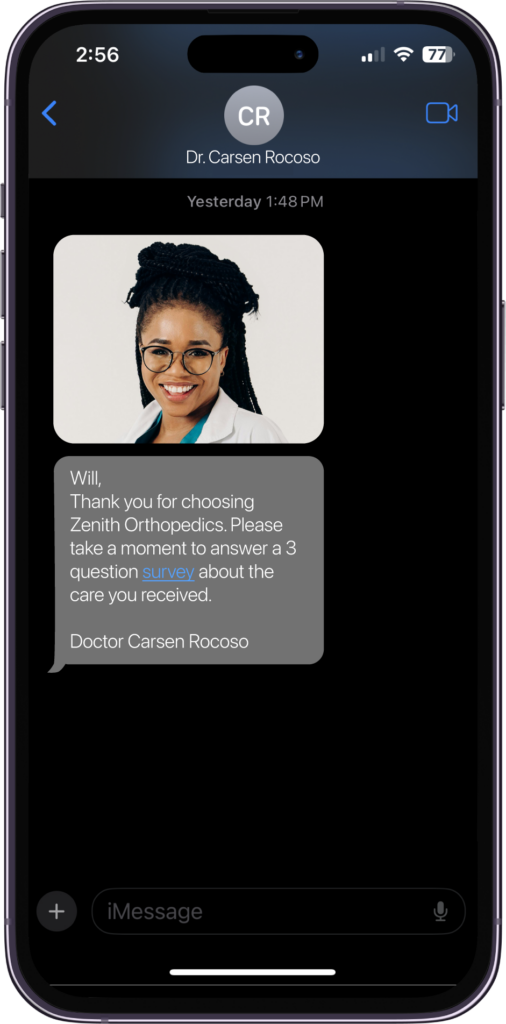Let’s open this important topic with a fact often overlooked by healthcare providers—a medical practice is a business. This realization is crucial for the growth and sustainability of profit-oriented healthcare, dealing with the reality of a highly competitive marketplace. The question of ethics may be the first thought when thinking about your care and business as equal. But, seeing your healthcare practice as a profitable entity doesn’t make it less human—it encourages devotion to enhancing care quality and its longevity.
Once you’re aware that providing the best care and treating your practice as a business are undeniably intertwined, the next step is to adopt marketing as the running force of your healthcare business. Knowing that patients increasingly turn to the internet for health information, a digital marketing strategy becomes a necessity for any doctors wanting to efficiently address patient needs and reach business objectives. Ignoring the role of digital marketing can make you fall behind, leaving you at the margin of the market.
How to use a well-crafted digital marketing strategy in healthcare:
What’s a Digital Marketing Strategy for Healthcare and Does It Matter?
 We’re all part of the digital revolution. The Internet has become our first stop for almost every inquiry, and that has ultimately changed the way businesses engage with customers. Or, in this case, how you interact with your patients and earn their trust and loyalty.
We’re all part of the digital revolution. The Internet has become our first stop for almost every inquiry, and that has ultimately changed the way businesses engage with customers. Or, in this case, how you interact with your patients and earn their trust and loyalty.
A digital marketing strategy for healthcare is a comprehensive plan that encompasses various online channels— your website, online review platforms, social media, email, and more—to engage with existing and potential patients. It’s about using digital tools to enhance accessibility, improve patient experiences, and ultimately, drive better health outcomes. In an age where information is one click away, this strategy ensures that healthcare providers are visible, accessible, and relevant to those in need of care. Along with promoting services, it empowers patients with knowledge and choices. That makes it indispensable for building a modern healthcare practice.
A digital marketing strategy for healthcare also matters because of its cost-effectiveness and the possibility of reaching just the right demographic based on specific health issues or age. Plus, this kind of strategy provides valuable data so healthcare providers can better understand what patients need and want, making their services more relevant and helpful. To wrap up—it’s a modern shift toward patient-centered care, driven by digital means.
Digital vs. Traditional Marketing: What’s the Difference?
A dozen billboards about your practice around the town will certainly make you visible, but the big question is—to whom? Traditional marketing still offers exposure, but it lacks interactivity and personalization. Your billboards might catch someone’s eye, but they can’t engage a viewer or prompt immediate action like a well-targeted digital ad can.
While the traditional marketing approach includes a broad range of activities across various channels to reach and engage the audience, including print ads, events, and direct mail, a digital marketing approach focuses specifically on using online channels, such as social media, email, and search engines to achieve these goals, with the possibility of precise audience targeting, performance tracking, and measurement. On the other hand, the impact of traditional marketing on patient acquisition and engagement can be quite difficult to measure, making it difficult to pinpoint and understand your marketing Return on Investment (ROI).
However, this doesn’t mean that traditional marketing methods should be dismissed on the whole. In fact, recent data indicates that mailers can garner more consumer attention than digital ads. Instead, traditional marketing and digital marketing should be combined to maximize your efforts. In fact, you can now apply detailed tracking tools, call tracking and QR codes namely, to traditional marketing pieces that were nearly impossible to measure until now.
The fusion of traditional and digital marketing strategies isn’t just about following a trend—it’s a strategic move that aligns your healthcare business with evolving consumer needs and technological advancements.
How a Digital Marketing Strategy Can Turn Your Practice Into a Successful Healthcare Business
 Now that we know why a digital marketing strategy for healthcare matters, let’s explore how it can transform your practice into a sustainable and profitable healthcare business. The following strategic steps help shape the future of your healthcare business while staying in line with your mission.
Now that we know why a digital marketing strategy for healthcare matters, let’s explore how it can transform your practice into a sustainable and profitable healthcare business. The following strategic steps help shape the future of your healthcare business while staying in line with your mission.
Leveraging Your Patient’s Search Habits
Word-of-mouth still holds great power, but it has expanded to the online world—the overwhelming majority of people use Google to find healthcare. This is the age of informed patients. They actively research health information through different platforms, compare providers, and seek recommendations online before making decisions. That behavior is the core of the successful digital marketing strategy for healthcare.
Studies show that the impact of social media on health-related decisions is growing. Patients are increasingly using platforms like Facebook, X (formerly Twitter), and Instagram for information and support. By actively engaging on these platforms with educational content, interactive Q&As, and compelling stories, you can enhance visibility and establish credibility among potential patients. This also allows you to influence patient choices, leading to a bigger patient base and better health outcomes.
Besides social media, a digital marketing strategy should cover other points of interest of your patients. For example, setting up your Google Business Profile (GBP) and Apple Business Connect (ABC) will give potential patients all the crucial information they need—your location, working hours, contact information, services offered, and, most importantly, what other patients are saying about you. Knowing this, you can leverage the patients’ search habits even more. Local Search Engine Optimization will make you an easy-to-find option while a well-optimized website can become the knowledge base that’ll extend your brand visibility outside of your local district.
Digital Marketing Strategy for Healthcare Gets You Ahead of the Competition
Here’s the (not so) big secret: the healthcare sector is still lagging in adopting modern marketing practices. This is a unique opportunity for healthcare providers to differentiate themselves and get ahead of the competition. By embracing digital marketing early on, you can position your practice as a leader in the respective fields and gain a market lead.
The fast-paced nature of digital marketing strategy for healthcare demands agility and adaptability. For example, digital campaigns can be quickly adjusted in response to changing market tides or audience demands. Providers who embrace this flexibility can swiftly respond to patient needs, capitalize on emerging trends, and stay ahead of competitors who are slower to adapt.
Imagine missing out on delivering the right message to the right patient at the right time just because you’re not using digital tools that make it possible. It would be such a waste of precious opportunity for both your patients and you. Also, if you don’t leverage the benefits of digital marketing, someone else will. This could leave you struggling to promote your practice and attract more patients, instead of setting the bar high in healthcare marketing.
Enhancing Patient Experience and Retention
A couple of goals are always on the mind of medical professionals—patient satisfaction and patient retention. They often go hand in hand, because happy patients are more likely to come back, influencing the sustainable growth and a solid reputation of your healthcare business.
A digital marketing strategy for healthcare transforms the patient journey into a seamless, engaging, and satisfying experience, encouraging long-term loyalty and fulfillment from the first online interaction to post-appointment follow-ups. However, to make this work, you need to learn what your patients think about the care you provide.
Patient review management, which involves tracking and responding to patient feedback, reveals its full potential when used within a digital marketing strategy. For instance, integrating automated patient surveys will show you how you look in the eyes of your patients by collecting and reporting data in a HIPAA-compliant way. This allows you to simultaneously process results from different sources and get real insights into your patients’ experience while saving time and money.
Also, using Patient-Reported Outcomes (PRO) as a form of direct feedback from the patients who have undergone your treatments is of high importance for your healthcare business. This data can help you address any shortfalls and increase patient satisfaction, while your satisfied patients’ stories can promote and humanize your brand (with their explicit and written consent, of course).
Tracking Marketing Efforts for Optimization
 The cost-effectiveness of digital marketing, particularly for small to medium-sized healthcare practices, is another area where the industry lags. Traditional marketing often requires investment with uncertain returns, whereas digital marketing offers scalable, budget-friendly options that can yield a higher ROI. This economic efficiency remains underexploited in healthcare, presenting a golden opportunity for providers to maximize their marketing budgets and achieve greater financial performance.
The cost-effectiveness of digital marketing, particularly for small to medium-sized healthcare practices, is another area where the industry lags. Traditional marketing often requires investment with uncertain returns, whereas digital marketing offers scalable, budget-friendly options that can yield a higher ROI. This economic efficiency remains underexploited in healthcare, presenting a golden opportunity for providers to maximize their marketing budgets and achieve greater financial performance.
Digital marketing strategy for healthcare offers continuous monitoring and optimization of marketing efforts. It allows you to track Key Performance Indicators (KPIs) such as patient acquisition cost, conversion rates, and patient engagement metrics to see the effectiveness of your marketing. By analyzing data insights and adjusting strategies accordingly, you can optimize marketing costs to achieve desired business outcomes.
Additionally, tracking your digital strategy achievements is essential for maximizing marketing ROI. Through analytics tools and performance metrics, you can assess the effectiveness of your marketing spend, identify areas of improvement, and make data-driven decisions. Continuously refining and optimizing your digital marketing strategies ensures your marketing money delivers concrete results.
Grow Your Healthcare Business in Line with the Digital Age
After seeing the power of digital marketing strategy for your practice’s sustainability and profitability, the question isn’t whether you need this kind of strategy, but how to develop and implement one.
To effectively conduct a digital marketing strategy for your healthcare business, you can rely on SocialClimb’s comprehensive and HIPAA-compliant platform. Use automated features to get the most out of your marketing efforts and manage all digital and traditional campaigns in one place. You can easily engage with your patients through different channels, monitor online reviews, track patient satisfaction, and measure important metrics in real time.
Finally – track your marketing KPIs to make data-informed decisions, attract more high-value patients, put high-value procedures in the spotlight, and increase your healthcare business profitability.











